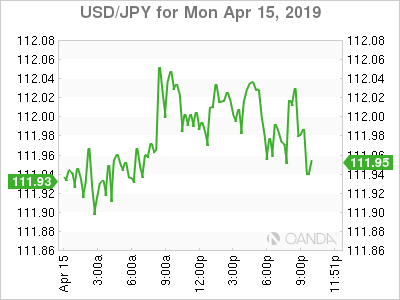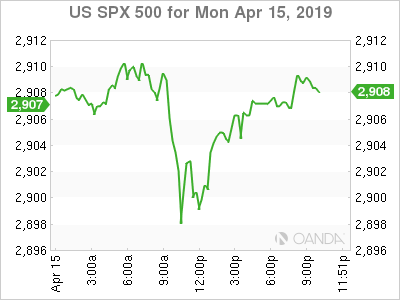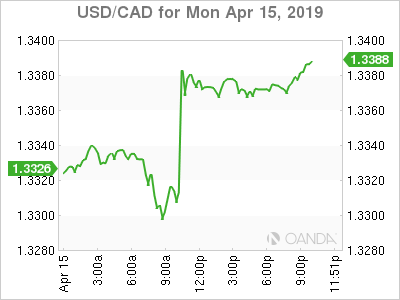Much of today’s attention fell on non-market moving events. A terrible fire broke out at Notre Dame Cathedral and a redacted version of the Mueller report is expected to be presented by Attorney General William Barr to Congress on Thursday. Markets had a negative start to the trading day following poor earnings results from the banks, while the dollar posted a mix reaction to the New York Fed Empire index.
- USD- Empire Index shows future business falls to lowest level in 3 years
- S&P 500 – Financials pump the breaks on this rally
- CAD- Conservatives to return to power in Alberta
- Oil – Slow growth and nearing end of production cuts sink oil
- Gold – Weak earnings already priced in softer on trade outlook
USD
The US dollar provided lackluster moves to start the week against most of its trading partners except for the loonie. Early in New York, the dollar posted a mix reaction to the Empire State manufacturing survey. The headline posted a strong beat with a 10.1 reading, higher than the prior print of 3.1 and a beat of the 8.0 consensus. The index for future business conditions however fell to the 17.2 points to 12.4, the worst reading in over three years. The dollar finished the session little changed against the euro and yen.
The greenback posted its best gains against the loonie, as oil prices pulled back. The Australian dollar posted limited moves ahead of the release of the RBA’s policy minutes. The market has fully priced in a rate cut by the RBA by the end of the fourth quarter, tonight’s Minutes may provide a little more clarity on the RBA’s concerns to housing and global growth risks.
S&P 500
US stocks are unable to shake off a dismal earnings day from the banks. Both Goldman Sachs and Citigroup headlined today’s earnings disappointments, a sign that we could see the markets have correctly price in a weak first quarter. Financials could see some good results from the last couple rounds of rate hikes, but the outlook is like to be dampened by the Fed’s dovish stance.
Despite the recent rally with stocks, many investors are still on the sidelines and assessing the outlook for the US economy. So far, the consumer seems healthy and credit markets are fine, but that could change when hear more results from the rest of the financials and we get our first taste of technology earnings, with IBM, Taiwan Semiconductor, and Netflix results.
CAD
Conservatives are expected take back power in Alberta’s provincial election on Tuesday, April 16th. The United Conservatives are expected to beat the NDP (center-left) party and if turnout is strong, it could spell trouble for PM Trudeau for his election later in the Fall. Current polling shows Albertans are both frustrated they do not see their share of federal spending and are unhappy with Trudeau’s policies effect on Alberta’s oil.
If the United Conservative Party leader Jason Kenney wins, markets will closely watch if he quickly delivers on his promise to turn off gasoline taps, a move that would signal a spike with gas prices. The battle for the Trans Mountain pipeline will heighten between Alberta and British Colombia if Kenney wins. If Kenney also shuts down the government’s plan to deliver crude by rail, we could see a Western Canadian Select crude fall.
Oil
Crude prices are off to a soft start on global growth concerns and uncertainty on how much longer OPEC + will deliver their production cuts. Over the weekend, Russian Finance Minister Siluanov told TASS news agency, “There is a dilemma. What should we do with OPEC: should we lose the market, which is being occupied by the Americans, or quit the deal?”
This is a growing concern that Russia will not agree on extending production cuts and we could see them officially abandon it in the coming months. The Russians would be happy to return production back to normal even if it meant we saw Brent trade back closer to the mid-50s area.
A soft start to earnings season is also painting a weaker economy picture that is raising demand concerns for oil. First quarter results are expected to be soft and weaker outlooks are not likely to spark any demand-side arguments for higher oil.
The supply-side remains the key for higher oil in the short-term and any escalation in Libya could prove to be key. Much of the fighting is far from key oilfields and export terminals, but we still could see that affect production levels. If production stalls in Libya, we could see that provide a key catalyst to keep the rally going for oil prices.
Gold
The precious metal remains vulnerable on trade optimism and on the nearing of major technical levels. The base case scenario on trade talks between China and the US is for an agreement to be reached in the next couple of months. Dismal earnings results appear to already be priced in, so we may need to see some disastrous outlooks for gold to catch a bid.
After failing to break out above $1,350, gold has made consistent lower highs and is now both testing the 50-day SMA and monthly lows. Selling pressures could accelerate on the break of $1,280, with the next major support level coming from the 200-day SMA, which is just above the $1,250 level.





